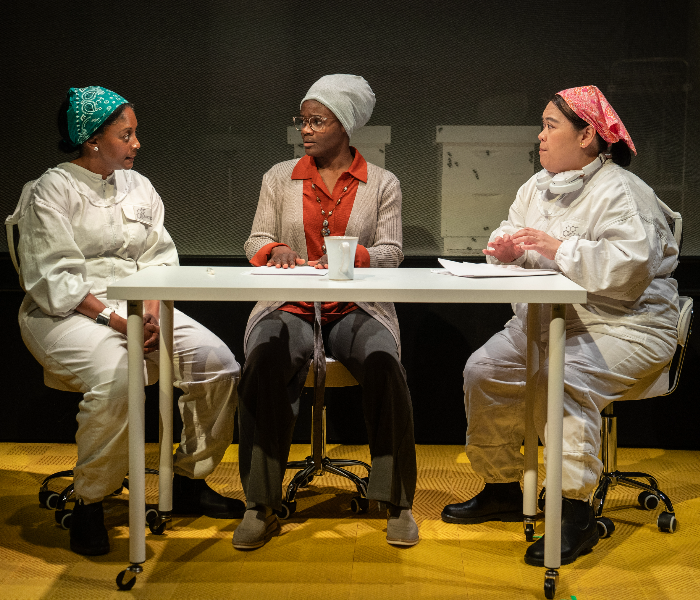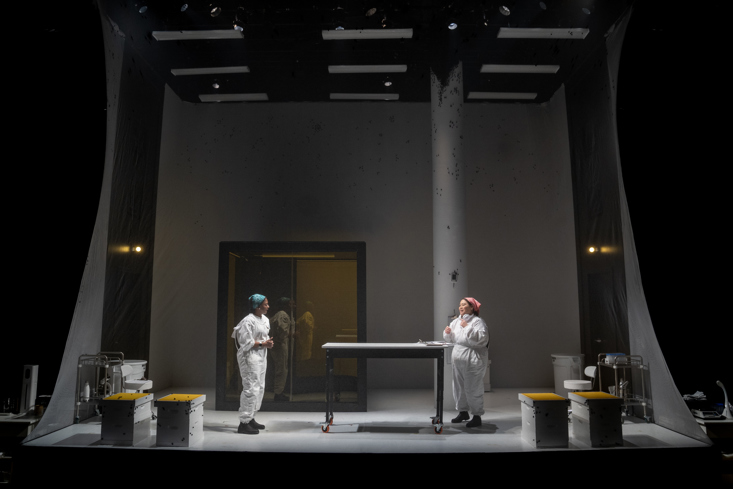Translate Page

April Matthis, Nimene Wureh and Carmen M. Herlihy in The Apiary at Second Stage Theater. Photo by Joan Marcus.
Director Kate Whoriskey and playwright Kate Douglas discuss The Apiary at Second Stage Theater
---
Kate Whoriskey was at the top of playwright Kate Douglas' wish list to direct her eco-thriller The Apiary, currently receiving its world premiere as part of Second Stage Theater's inaugural Next Stage Festival, which spotlights early career playwrights. It wasn't Whoriskey's impressive credits, including Sweat, Clyde's and Ruined, that attracted Douglas. It was the fact that they're both graduates of the Experimental Theatre Wing at NYU Tisch School of the Arts.
Douglas describes the program as "very niche and very small," but it boasts quite the track record. Their fellow alumni include The Public Theater's Artistic Director Oskar Eustis, Crazy Ex Girlfriend Emmy winner Rachel Bloom and the Internet's reigning zaddy Pedro Pascal. "It produces such singular artists," Douglas says. "I had faith in that lineage, and I said I'd love to work with someone who did the same training program that I did." Thankfully Whoriskey, a Second Stage regular, was game to collaborate and buzzing with innovative concepts.
Set two decades from now when bees are extinct in the wild, The Apiary takes place in a lab tasked with caring for a few remaining colonies. Despite the workers' best efforts, the bees continue to decline until two lab assistants accidentally discover a skin-crawling way to make them thrive. It's a dark comedy with a Little Shop of Horrors twist and an urgent message about the interdependence of our environment—without bees we'd lose a lot more than honey.
Douglas says the seed for her play was planted when she came across Neri Oxman's Synthetic Apiary, a science experiment/art installation that kept bees alive in a fully artificial environment. "I saw photos and videos of the space and I thought it was just so riveting and horrifying," says Douglas of the empty, antiseptic, all-white room. "I thought, I want to write a play for this space."
Initially, Whoriskey was intimidated at the prospect of staging the play since most of the action takes place behind netting that separates the audience from the actors (the five-person cast includes Taylor Schilling from Orange Is the New Black and Off-Broadway stalwart April Matthis). She overcame her worries by putting The Apiary through its paces, constantly trying new things. "She's an incredible stress tester," says Douglas. "There is a cohesive vision because it's gotten clearer and clearer through experimentation."
One of the biggest challenges was figuring out how to represent the bees. "In the script, the bees speak," Douglas says. "They've always had a voice, but putting the play in three dimensions we came to an impasse about how we were going to stage them." They toyed with the idea of projections but hoped for something tangible. Together, Douglas and Whoriskey decided a dancer, Stephanie Crousillat, would embody the swarm. "She's an extraordinary dancer," says Whoriskey, "but also she's able to articulate that it's live. So, the bees are something we can feel as opposed to just an element of technology."

It's touches like this that excited Whoriskey about taking on the show, especially since she describes much of the new work she typically directs as "naturalistic and realistic." Ultimately, The Apiary drifts into the metaphorical and magical, asking questions about climate change, bodily autonomy and scientific ethics. "I appreciate the lift into an imaginative, more poetic theatre," says Whoriskey.
Yet with so much packed into 70 minutes, both Douglas and Whoriskey resist the urge to pin the piece down. "The play is able to hold a lot for different people coming from different lenses, so I don't want to limit it by speaking to just one of them," says Douglas. "I hope it's a container in which people can experience something potent for them in the moment."
---
TDF MEMBERS: Go here to browse our latest discounts for dance, theatre and concerts.